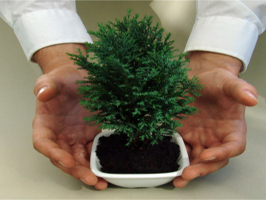 Forest-based sector announces substantial investments into Finland
Forest-based sector announces substantial investments into Finland
The eurozone's economic situation remained unstable in 2014. The decrease in demand for paper products slowed somewhat in the forest industry's main European markets. Demand for sawn timber and plywood increased. Aggregate forest industry exports remained almost level with the previous year.
“We expect the next government to make decisions that strengthen the forest industry's operating environment. It is imperative that the new government makes a commitment to avoid any industrial cost increases and cuts unnecessary red tape. If this does not happen, the gap between Finland and our competitor countries will continue to grow,” says Timo Jaatinen, Director General of the Finnish Forest Industries Federation.
More needs to be spent on transport route maintenance and repairs. In addition to the basic route network, also the lower-tier roads must be kept drivable so that timber can be delivered efficiently from forests to factories.
“Ensuring an adequate and steady supply of timber is an essential factor in the forest-based sector's investment considerations. Demand for timber is forecast to increase by ten million cubic metres. State subsidies should not steer processable timber into energy use because this competes with real and growing market-based demand,” Timo Jaatinen underlines.
Flexibility at the workplace and modernised collective labour agreements are also required for the forest industry's regeneration.
Paper demand continued to fall, pulp and paperboard production almost unchanged
Some 10.4 million tonnes of paper and paperboard was produced in Finland last year, about 1.7% less than in 2013.
Demand for printing and writing papers continued to decline in the developed markets. Finland produced almost 6.1 million tonnes of printing and writing papers in 2014. This is 3.4% less than in the previous year.
Production of packaging paperboard increased somewhat in 2014, thanks to a rising market for packaging materials. An annual growth rate of 0.6% was recorded.
Finnish pulp production decreased slightly compared to the previous year and came to some 7 million tonnes. The reduction from 2013 amounted to 0.9%.
Sawn timber and plywood production increased from 2013
There is still little sign of an upturn in construction activity on the domestic market, which is important for wood products. There was growth in exports of sawn timber to Europe's large destination markets the UK and Germany as well as to countries in North Africa and the Middle East in January-November.
Almost 10.9 million cubic metres of sawn softwood timber was produced in 2014, up 4.6% from the previous year. Plywood production has grown an estimated 6% to almost 1.2 million cubic metres.
Bioproduct factory being planned, world's first wood-consuming biorefinery completed
The forest-based sector is planning or preparing for investments in Finland that are worth about €1.5 billion in total.
A plan to build a bioproduct factory in Äänekoski worth some €1.1 billion was announced last spring – this was the largest such investment announced up to that date. A decision concerning the realisation of this investment is expected in spring 2015.
The world's first biorefinery, which makes wood-based renewable diesel, was completed in Lappeenranta. It commenced commercial production operations in January 2015.
A project to expand the Kymi pulp mill was launched in 2014 and it is scheduled for completion this year.
A fine-paper machine in Varkaus is being adapted to manufacture raw materials for paperboard packaging. The conversion should be completed in 2015.
A new €43-million investment into a wood construction module production line in Varkaus was announced in February 2015. The plan is for production to commence in the second quarter of 2016.
Further information: Director General Timo Jaatinen, Finnish Forest Industries Federation, tel +358 9 132 6600.
Finnish Forest Industries Federation - FINLANDIA - 10 febrero 2015
Forest-based sector announces substantial investments into Finland
- Detalles
- Categoría: El mundo
- Visto: 773
